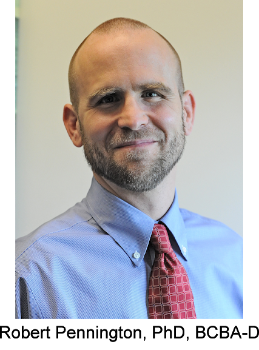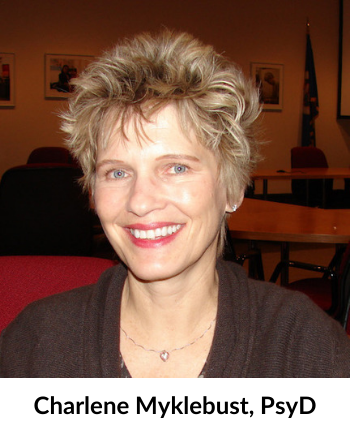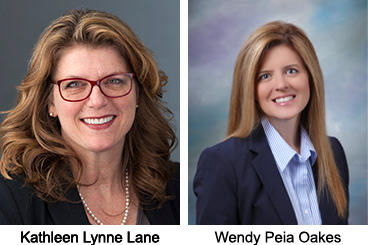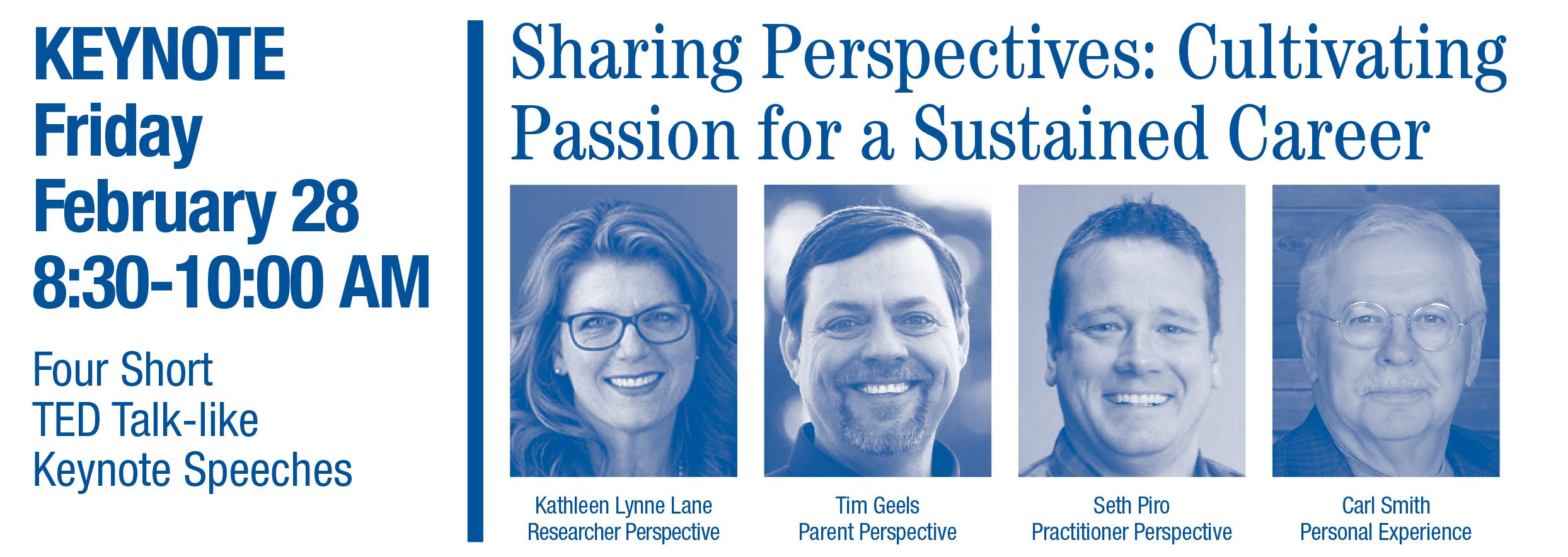38th Annual Midwest Symposium for Leadership in Behavior Disorders
February 27, 28, 29, 2020
Sheraton Kansas City Hotel at Crown Center
Kansas City, Missouri
Thursday, February 27 | Presymposium Workshops
Morning Sessions, 9:00 AM - 12:00 PM
-
Timothy Landrum, PhD and Robin Parks Ennis, PhD
1. An Ounce of Prevention: Antecedent Strategies That Really Work

Most problem behaviors are predictable and preventable. Low-intensity antecedent strategies are tools teachers can use in the classroom to prevent problem behaviors from occurring. In this session, we will discuss steps for implementing a variety of proactive and preventative strategies to support the behavior of all students, including behavioral momentum, opportunities to respond, choice, precision requests, and precorrection. (Level: Beginner/Introductory, Intermediate)
Timothy Landrum, PhD, Professor, University of Louisville, Louisville, KY and Robin Parks Ennis, PhD, Associate Professor, University of Alabama at Birmingham, Birmingham, AL
-
Robert Pennington, PhD, BCBA-D
2. Write on! Teaching written expression to learners with complex communication needs

This session will guide participants through research-based practices for teaching written expression to learners with complex communication needs, including those with intellectual disabilities and autism spectrum disorder. Participants will leave this entertaining session empowered with new strategies to apply in their classrooms.
Robert Pennington, PhD, BCBA-D, Associate Professor, University of North Carolina-Charlotte, Charlotte, NC
-
Tim Geels, MA
3. Safe Shelter in the Storm: Providing Emotional Safety as a Tool for Student De-Escalation

According to the Center for Disease Control, approximately 1 in 5 kids living in the United States displays some signs or symptoms of a mental health disorder in a given year. Attendees will learn about conflict de-escalation and trauma-informed positive behavior interventions and supports for students with mental health needs. The session will emphasize prevention but also provide tools to deescalate and respond to crisis events. Participants will walk away from the session with four things “to do” they can utilize immediately when responding to escalated or crisis behavior. (Level: Beginner/Introductory)
Tim Geels, MA, Senior Vice President of Instruction and Corporate Implementation, The Mandt System, McCook Lake, South Dakota
-
Michael Kennedy, PhD
4. Descriptive, Specific, and Unbiased: A Session on Data-Driven Feedback and Professional Development

This presentation will provide demonstrations of data-driven, specific, and unbiased coaching process to support teacher growth and implementation of evidence-based classroom management practices. The coaching process is multimedia-based, individualized, and leverages a new classroom observation instrument called the Classroom Teaching Scan (CT Scan) along with instructional vignettes to build knowledge and support fidelity of implementation. The CT Scan is a low-inference observation instrument that allows an observer to capture data in real time. (Level: Beginner/Introductory, Intermediate, Advanced)
Michael Kennedy, PhD, Associate Professor, University of Virginia, Charlottesville, VA
-
Charlene Myklebust, PsyD
5. Mindfulness Matters: Healing Trauma and Emotional Dysregulation

Attendees will learn the science behind the impact of mindfulness and mindful education on youth who have been impacted by trauma or have special education disabilities. Adverse childhood experiences and emotional and behavioral disabilities often interfere with the acquisition of social emotional learning skills, academic performance, and therapy progress. Mindful interventions can readily be incorporated into academic instruction, circle processes for restorative practices and positive behavior interventions and supports initiatives. Participants will learn about practical interventions that are user friendly for teachers, related service providers, and mental health professionals. Mind UP Grades pre-k-2, 3-5, 6-8 (Level: Intermediate)
Charlene Myklebust, PsyD, President and Education/Mental Health Consultant, Professional Education Pal, LLC, Minneapolis, Minnesota
Afternoon Sessions, 1:30 PM - 4:30 PM
-
Kathleen Lynne Lane, PhD, BCBA-D, CF-L1 and Wendy Peia Oakes, PhD
SESSION CLOSED 6.Low-Intensity Strategies to Support Engagement: Practical Strategies that Work!

We will present feasible strategies for supporting academic engagement and minimizing disruption including instructional choice, increasing opportunities to respond, and active supervision. We provide step-by-step procedures for using these strategies with high fidelity, offering illustrations in elementary, middle, and high school settings. (Level: Intermediate)
Kathleen Lynne Lane, PhD, BCBA-D, CF-L1, Professor of Special Education and Interim Associate Vice Chancellor for the Office of Research, University of Kansas, Lawrence, KS and Wendy Peia Oakes, PhD, Associate Professor, Arizona State University, Tempe, AZ
-
Sandra Chafouleas, PhD
SESSION CLOSED 7. Got Trauma-Informed in Your School? Integrating Trauma-Informed Care within Social, Emotional, and Behavioral Tiered Services

“Trauma-informed” certainly is a trending term, yet what it means within tiered systems of school-based services is less clear. This session will review trauma-informed core principles, highlighting connections within a behavioral framework. Strategies for integrating a trauma-sensitive focus across the continuum of preventive supports will be provided, with focus on practical classroom take-aways. In addition, examples of evidence-informed trauma-specific individualized supports will be shared. Active discussion around opportunities for participants to strengthen their existing continuum of behavioral supports through a trauma-informed lens will occur. (Level: Intermediate)
Sandra Chafouleas, PhD, Board of Trustees Distinguished Professor, University of Connecticut, Neag School of Education, Storrs, CT
-
Ruth Aspy, PhD
8. Leveling the Playing Field: Providing True Access to Intervention for Individuals on the Autism Spectrum

Individuals with autism have complex needs. Traditional mental health, behavioral, and educational interventions must be adapted in order to address the underlying characteristics of autism in a comprehensive manner. The many strategies available and ways autism impacts a person complicate the identification of supports and strategies for education programs. This session will center on two helpful principles: (1) effective strategies must address strengths and needs of the individual and (2) effective programs must address sensory and biological needs and include reinforcement, structure (visual tactile supports), obstacle removal, and skills to teach. Participants will learn how the Ziggurat Model uses these 5 levels to provide a template for modifying traditional interventions so that those with ASD can participate and benefit in new ways (Level: Intermediate)
Ruth Aspy, PhD, Psychologist, Ziggurat Group, Inman, SC
-
9. Brainstorming to Editing: How to Support Students with Emotional and Behavioral Disorders to Write More Effectively
Writing is a major source of frustration for many students with disabilities across all ages, and it can be a challenge to teach writing to students with diverse needs and abilities. In this workshop, participants will learn research and evidence-based strategies to support upper elementary and secondary students with the writing process from brainstorming to writing to editing. The workshop will focus on how to incorporate the self-regulated strategy development framework, technology, and principles of universal design for learning in writing instruction. Participants will be provided with resources and materials use in their classrooms. (Level: Beginner/Introductory, Intermediate)
Soo Ahn, PhD, Assistant Professor, Iowa State University, Ames, IA
Friday, February 28

Symposium activities on Friday include the following:
8:30 – 10:00 AM Keynote Session
10:20 – 11:20 AM Concurrent Breakout Session - Set 1
11:30 AM – 12:30 PM Concurrent Breakout Session - Set 2
12:30 – 2:00 PM Lunch, on your own
2:00 – 3:00 PM Concurrent Breakout Session - Set 3
3:15 – 4:15 PM Concurrent Breakout Session - Set 4
4:15 – 6:00 PM Poster Session
8:00 – 11:00 PM Symposium Party & Lip Sync Battle
Download 2020 Symposium Program
Saturday, February 29 | 9:00 - 11:30 a.m. | Special Workshop Sessions
-
Mitchell L. Yell, PhD, Carl R. Smith, PhD and Antonis Katsiyannis, EdD
1. Developments in Special Education Law: What EBD Teachers Need to Know and Why They Need to Know it

We will review legal developments from 2018-2019 that have particular relevance to the education of students with EBD. We will focus on court rulings, State Educational Agency (SEA) decisions, and policy letters from the U.S. Department of Education.
Mitchell L. Yell, PhD, Professor, University of South Carolina, Columbia, SC, Carl R. Smith, PhD, Professor Emeritus, Iowa State University, Ames, IA, and Antonis Katsiyannis, EdD, Professor, Clemson University, Clemson, SC
-
2. Create a Lifestyle of Wellness in the Face of Secondary Traumatic Stress

This session will explore why so many helping professionals struggle to create and maintain a lifestyle of wellness and self-care. Exposure to chronic and secondary traumatic stress requires knowing the signs and symptoms to prevent teacher burnout. If you want to prioritize your self-care, then this session is for you! (Level: Intermediate)
Rachel Jones, MEd, Manager of Trauma Informed Treatment, Missouri Department of Mental Health, Division of Behavioral Health, Jefferson City, MO
-
Jessica Nelson, EdD and Scott Fluke, PhD
3. Superheroes in the Classroom: How to Train and Support Paraprofessionals

Paraprofessionals are the lifeblood of special education. When they are skilled, your students thrive. But when they struggle, so will your students. In this session, attendees will learn strategies to train your paraprofessionals to implement evidence-based strategies with high fidelity. Practical and classroom-proven training techniques will be shared, including strategies for regular meetings, in-service training, and modeling. With these strategies in place, your paraprofessionals will be ready to implement behavior plans, lead the classroom, and support students in a variety of special and general education settings. (Level: Beginner/Introductory, Intermediate)
Jessica Nelson, EdD, Assistant Professor, Missouri State University, Springfield, MO and
Scott Fluke, PhD, Emotional Disturbance Program Facilitator, Olathe Public Schools, Olathe, KS -
Michael & Nancy George, EdD
4. Lessons from the Field: Things to Do and Things to Stop Doing when Working with Students with Emotional and Behavioral Needs

This workshop is aimed at educators who work in alternative special education or self-contained programs for students with behavioral needs. Topics will include: Creating a Vision, The Power of our Beliefs, The Importance of Language, Setting and Repeating Clear Expectations, Point Cards and Data Collection, Solving Problems through Problem Solving, The Importance of High Quality Instruction, Why a Program is Important, and Some Things You Never Should Do. These strategies, if used with fidelity, will decrease the need for seclusion and restraints and seclusion or exclusionary discipline. (Level: Beginner/Introductory, Intermediate, Advanced)
Michael & Nancy George, EdD, Consultants, George & George Education Consulting, Bethlehem, PA


